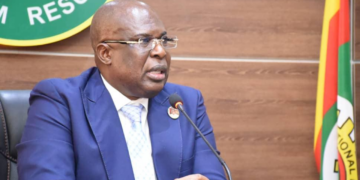The federal government has again taken another initiative to collaborate with stakeholders in the cyber security ecosystem to intensify the war against cyber criminals that have become more daring in recent times.
This was the crux of the Cyber security Conference 2022 with the theme “Future of cyber security: emerging issues and solutions,” organised to mark the 25th anniversary of the Central Securities Clearing System (CSCS) that was held in Abuja recently.
The National Security Adviser (NSA) Major General (rtd) Babagana Monguno, in his keynote address said that outbreak of the COVID-19 pandemic led to the unprecedented rise in the dependence on cyberspace vis-a-vis advancement in technologies, innovations and service delivery. This, he said, led to a surge in the number of trade vectors and vulnerabilities in enterprise networks thereby increasing cyber security risks.
The NSA, who was represented by Major General Samad Akesode said “the cost of cybercrime in 2021 is estimated to be about 6 trillion dollars and that of the year 2022 could be better imagined.
Recall that the Nigerian Communications Commission (NCC) has said Nigeria loses about 500 million US dollars annually to cybercrime, a figure which amounts to about 0.08 per cent of the country’s GDP.
The increasing rate of cybercrime has become more alarming than ever as it has become organised crime sometimes purportedly backed by state actors.
The NSA said further that “Financial institutions and capital market firms are not immune to this risk given their reliance on information technology, growth in mobile and digital channels as well as the accelerating pace of the digitalisation of global markets.”
He noted that in line with the deliverables of the National Cyber security policy 2021 the government has taken steps to address the challenges of cybercrime, stressing that “the prevention of all this is the all-important task of central security system and it is in our best interest to work together in this regard to address these issues.
“Another challenge is the proliferation of Ponzi schemes as well as unregistered fund managers, which has extorted, robbed and victimised investors of their hard earned resources here in the country.
“The emergence of virtual currencies has been of serious concern due to its instability, high risk facilitation of money laundering and romance scams. It is also very worrisome to notice the growing fake news and the use of crypto currencies to purchase illicit items in the dark web with negative impact on our financial institutions especially the capital market.
“This ugly situation underscores the urgent need t for a robust framework to address these concerns and efforts are in progress to produce this desired framework. The federal government has resolved to ensure a resilient cyber ecosystem, efforts are ongoing to amend the cybercrime act of 2015 at ONSA, which will address the numerous other challenges including the use of cyberspace to perpetrate fraudulent schemes as well as protect civilians and the susceptibility associated with the virtual currency so as to boost investors’ confidence in the Nigerian economy,” he said.
Also speaking, the chairman board of directors of the CSCS Oscar Onyema, said the threat posed by cybercrime globally cannot be overemphasised.
“Our hyper-connected world means that technology has permeated our livelihood and as technology continues to revolutionise the financial market it comes with the scary baggage of cybercrime,” he said.
He quoted the cyber-security venture global rating which showed that cybercrime is expected to grow by 15 per cent annually reaching an estimated 10.5 trillion US dollars by 2025 up from three trillion dollars in 2015.
According to him these figures lead criminals to make significant investment in neo-technology to exploit the opportunities arising from technological advancement.
He warned that the impact of cyber-attacks is no longer remote given the interconnectedness of systems, stressing that it only takes one weak link to shut down an entire ecosystem
“This issue has pertinence to national security and economic sustainability. I hope we will all take relevant action towards protecting our network for the mutual benefit of our ecosystem and the nation at large.
“As we all collaborate towards securing our businesses and institutions against our common enemy-cyber criminals, it is a battle and we must unite to win this cyber security war,” he said
The managing director/CEO of CSCS, Haruna Jalo-Waziri said that as pioneer of document and process digitisation in the Nigerian Capital Market, the CSCS identified cyber security as an existential threat to the stability of the economic and business ecosystem.
“This informed the evolution of our strategic focus towards cyber security from our entity as a nucleus through the provision of thought-leadership as well as pioneering this conference series as a platform to stir the intellectual discourse, facilitate knowledge sharing and awareness building, and drive collective action,” he said.





